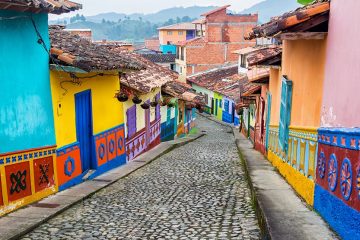How to Manage Your Dietary Restrictions While Traveling (and Still Eat Great Food)
Get a Taste of the World
If you can’t eat certain foods, don’t let it hold you back from seeing the world.
Having dietary restrictions — whether you are a vegetarian or vegan, are allergic to a food such as nuts, or have an intolerance such as gluten or dairy — can make dining out difficult no matter where you are. When you throw in the factors of being in an unfamiliar country, not speaking the language and trying to figure out foreign cuisine, it can be even more challenging.
So how can you travel if you have allergies or dietary restrictions? Here are some helpful tips for traveling with dietary restrictions that will help you enjoy eating exotic dishes all around the world.
Research Before Your Trip
Do some research into your destination to find out what you can expect in terms of the cuisine before you book. If you’re traveling as a vegetarian, for example, it’s a lot easier to find vegetarian dishes in India (where a third of the population is vegetarian) than in South America (where barbecued meat reigns supreme).
Similarly, if you’re traveling as a vegan you may want to see which countries naturally have a diet that is close to your own, or that cater well to vegans. Sweden, Italy and Germany are all great choices; plus, most people speak English so it’s easy enough to modify any vegetarian dishes a step further to be vegan.
You can also call ahead to your airline, hotel and tour company to let them know about your dietary restrictions. They can usually accommodate you, but they need to know in advance so they can prepare.
Bring Your Medicine
When it comes to traveling with food allergies, make sure you bring your EpiPen on the trip just in case. In the case of traveling with lactose intolerance, you can bring along lactase pills to take before a meal which will temporarily allow you to digest any accidental dairy that sneaks into your meal.
You should ask your doctor for a prescription to carry with you in case you misplace your pharmaceuticals.
Book a Trip Designed for Your Diet
Did you know there are kosher cruise trips available? Or vegetarian cycling trips around England?
There’s even such a thing as gluten-free travel, which makes traveling abroad with celiac disease or a gluten-free diet all the more easy. These tour groups get as specific as gluten-free trips to Italy — allowing you to enjoy all the scrumptious Italian cuisine without the stress.
When you book a trip that is custom designed to your diet this can take a lot of the stress out of traveling, because you will not have to worry about it as much.
Carry a Dietary Restriction Card with You
If you don’t speak the language, one of the most helpful things you can do is carry a card with you that explains your dietary restriction in the local tongue. You can simply show it at every restaurant you go to, so you don’t have to try to communicate in sign language that you don’t eat seafood.
There are companies that print dietary restriction cards or allergy translation cards that you can buy, or you can make your own using an online translator or a friend who speaks the local language.
Want to be able to relive your trips in the years to come or share your experiences with others? Here are some great ways to document your travels.
Stay Somewhere with a Kitchen
It is also a great idea to stay somewhere with a kitchen when you travel, so you can cook your own food for some of your meals. You will be able to go to the local supermarket and buy ingredients you know you can eat.
Sometimes it’s hard to know what really goes into your food in a restaurant, so cooking for yourself while traveling can eliminate some of the worry.
Always Have Snacks
You never know when you might have a flight delay or be stuck at a bus station in the middle of nowhere with very little food options, so it’s great to have snacks with you. These can be protein bars, crackers, dried fruit or any other handy, portable snack.
This way, you will never be left with a hungry, grumbling stomach and no choices of what to eat.
You don’t have to let your diet get lost in translation when you travel. There are many ways you can avoid the foods you can’t eat while you are on the road so you can enjoy your adventure.







